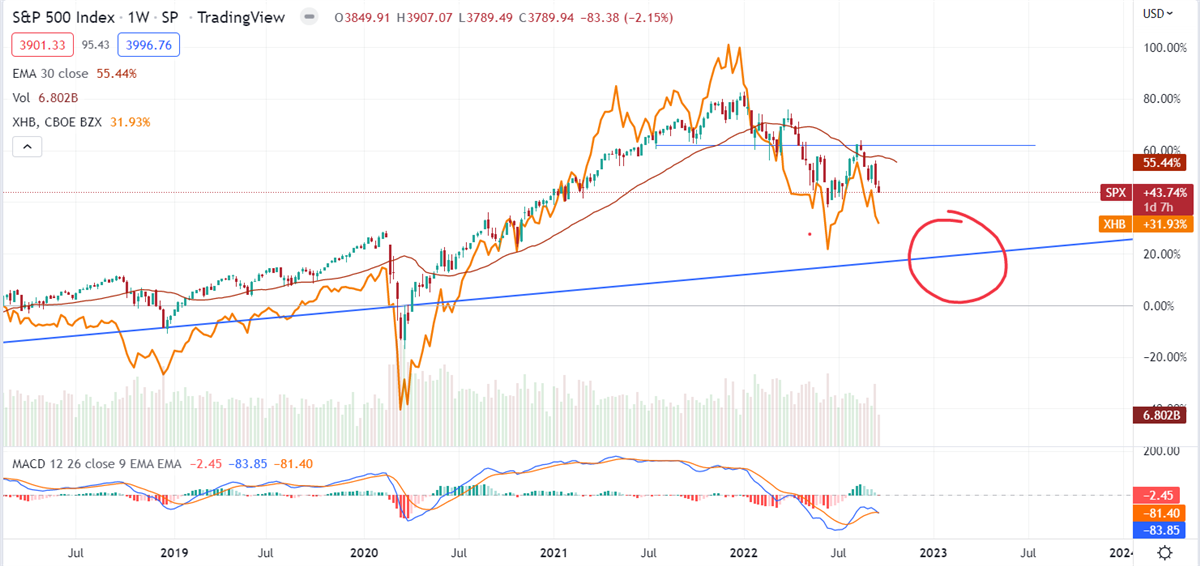It was just a year or so ago that Wall Street pundits were touting a Golden Age for the homebuilders like Lennar (NYSE:LEN) and KB Home (NYSE:KBH).
The combination of low-interest rates, high demand for homes, a lifestyle shift brought on by the pandemic, and pandemic stimulus had the industry set up for growth in a way that was only limited by labor availability.
And then inflation started to rise, the FOMC let it get out of control, and now it looks like the Golden Age is already over before it even really got started. The latest string of housing data suggests not only a pullback in home-buying and homebuilding activity but the fresh 75 basis point interest rate hike is only going to add more pressure to the market. Not to mention the additional 160 bps of interest rate hikes the FOMC has promised by next year.
On the flip side, Chairman, President, and CEO of KB Home Jeffrey Metzger, in the company's Q3 earnings report:
"The long-term outlook for the housing market remains favorable. However, the combination of rising mortgage interest rates, ongoing inflation, and other macro concerns has caused many prospective buyers to pause on their home-buying decision."
The takeaway from this is that home building demand remains strong, but the Golden Age is on pause.
The question that needs to be answered is how long a pause and how deep a correction the market is facing, and it looks like it could be a big one. The average rate on a 30-year fixed rate conforming mortgage is pushing the 7.0% range right now, and it is going to go much higher before the next big home-buying season. Imagine, interest rates are up a full 150 basis points since the beginning of summer, adding $200 to $400 per MONTH to the average new mortgage payment, which is one heckuva of a reason to wait on a new home purchase. Especially if you think the FOMC will spark a recession and need to cut rates by the end of next year.
Mixed Results And Weak Guidance From Lennar And KB Home
Lennar and KB Home, the #2 and #5 largest home builders by revenue, reported near-identical reports that come with mixed results for Q3 and weak guidance for Q4.
The takeaway from the reports is that margins are improving on rising prices, but interest rates and prices together are curbing volume. In the case of Lennar, the company reports a -12% decline in New Orders, and both companies report flat backlogs versus last year. In the case of KB Home, net orders decreased by 50%, and this decline should be expected to continue into the coming quarters.
In regard to the margins, both companies reported a wider gross and operating margin driven by higher realized selling prices and a surge in financing activity as home buyers front-run interest rate hikes but offset by rising costs as well.
The takeaway here is that cash flow and dividends should remain healthy during the contraction, but revenue and earnings growth is quickly evaporating, and a decline may be at hand. As for the guidance, both companies issued guidance below the Marketbeat.com consensus targets, but Lennar stands out. Lennar is calling for homebuilding revenue of $7.4 billion at the high-end of its range compared to the $10.19 billion consensus figure. That's a big miss.
Executive Chairman Stuart Miller said:
"Sales have clearly been impacted by rising interest rates, but there remains a significant national shortage of housing, especially workforce housing, and demand remains strong as we navigate the rebalance between price and interest rates.
Accordingly, during the quarter, we continued to focus on pricing to market and rightsizing our inventory to generate significant cash flow."
The Technical Outlook: Homebuilders Lead The Market
The homebuilder sector has been leading the SPDR® S&P 500 (NYSE:SPY) for years and with higher volatility as well. The beta on the SPDR S&P Homebuilders ETF (NYSE:XHB) is 1.51 over the past five years, and it looks like the index is heading lower at this time. The ETF may find strong support at or above the $51 level, but if it doesn't, a much larger decline could be in store before this market bottoms.

